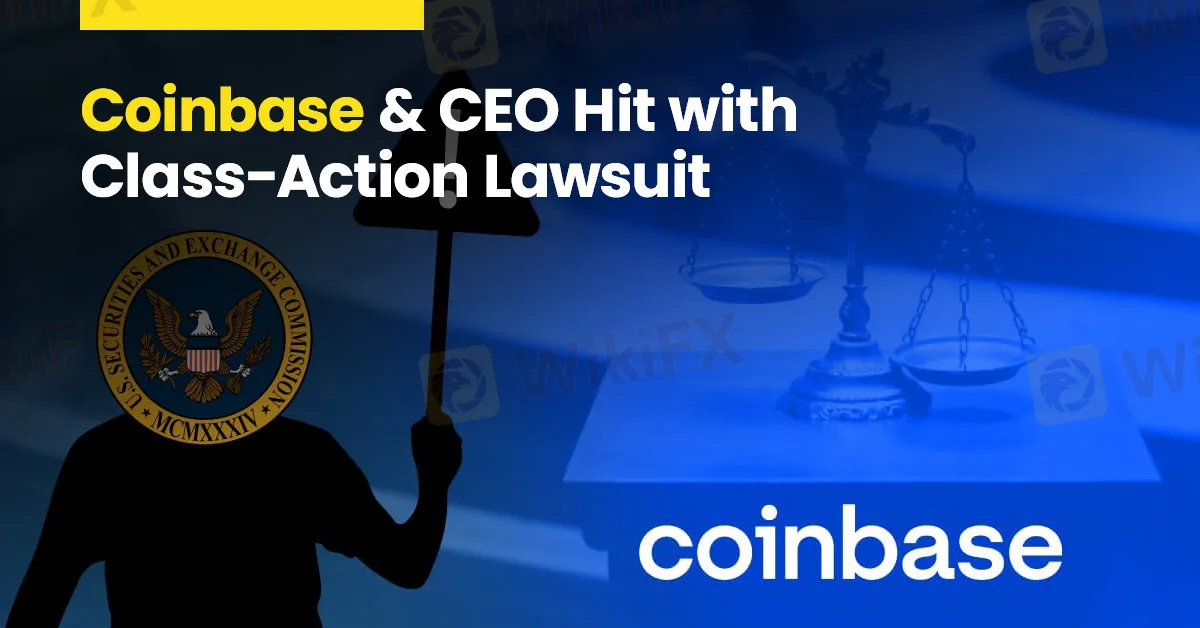简体中文
繁體中文
English
Pусский
日本語
ภาษาไทย
Tiếng Việt
Bahasa Indonesia
Español
हिन्दी
Filippiiniläinen
Français
Deutsch
Português
Türkçe
한국어
العربية
Coinbase & CEO Hit with Class-Action Lawsuit
Abstract:Coinbase and its CEO, Brian Armstrong, are now embroiled in a fresh class-action lawsuit, recently filed in the United States District Court for the Northern District of California, San Francisco Division. The lawsuit contends that Coinbase's operational framework is unlawful, accusing the company of knowingly misleading investors into purchasing securities, a violation of state securities regulations.

Coinbase and its CEO, Brian Armstrong, are now embroiled in a fresh class-action lawsuit, recently filed in the United States District Court for the Northern District of California, San Francisco Division.
The lawsuit contends that Coinbase's operational framework is unlawful, accusing the company of knowingly misleading investors into purchasing securities, a violation of state securities regulations.

Represented by plaintiffs Gerardo Aceves, Thomas Fan, Edwin Martinez, Tiffany Smoot, Edouard Cordi, and Brett Maggard from California and Florida, the lawsuit argues that Coinbase has been flouting securities laws since its inception. It specifically identifies tokens such as Solana (SOL), Polygon (MATIC), Near Protocol (NEAR), Decentraland (MANA), Algorand (ALGO), Uniswap (UNI), Tezos (XTZ), and Stellar Lumens (XLM) as unregistered securities.
The complainants assert that Coinbase's own user agreement implicitly acknowledges its status as a “Securities Broker,” deeming the digital assets sold by the platform as investment contracts. They further contend that Coinbase Prime brokerage functions as a securities broker. Seeking full rescission of the purchases, statutory damages under state law, and injunctive relief via a jury trial, the plaintiffs aim to rectify their grievances.
This legal action echoes previous accusations against Coinbase, where it has been accused of vending unregistered securities. Coinbase has consistently argued that secondary sales of crypto assets do not adhere to the criteria for securities transactions, disputing the application of securities laws to its operations.
Amidst this legal strife, Coinbase is concurrently entangled in a legal dispute with the U.S. Securities and Exchange Commission (SEC), which also scrutinizes whether tokens traded on the platform should be classified as securities. The SEC alleges that the largest U.S. cryptocurrency exchange has contravened securities regulations by facilitating the trading of at least 13 crypto tokens that ought to have been registered as securities.
In response to a judge's ruling permitting the SEC case to proceed, Coinbase has lodged an interlocutory appeal. Furthermore, crypto attorney John Deaton has submitted an amicus brief on behalf of over 4,700 Coinbase customers.
Despite grappling with these legal hurdles, Coinbase has reported a robust financial resurgence in the first quarter of 2024, buoyed by enhanced market performance and the debut of spot Bitcoin exchange-traded funds (ETFs). The exchange disclosed $1.6 billion in total revenue and $1.2 billion in net income, achieving $1 billion in adjusted earnings before interest, taxes, depreciation, and amortization.

Disclaimer:
The views in this article only represent the author's personal views, and do not constitute investment advice on this platform. This platform does not guarantee the accuracy, completeness and timeliness of the information in the article, and will not be liable for any loss caused by the use of or reliance on the information in the article.
Read more

Licence Denied: Tokenize Quits Singapore After MAS Decision
The Monetary Authority of Singapore (MAS) has denied Tokenize Xchange’s application for a Major Payment Institution (MPI) licence, prompting the cryptocurrency platform to cease its operations in Singapore and shift focus to Labuan, Malaysia.

Harsh Truths About ATC Brokers Every Trader Must Know
Many regulated brokers hide the risks associated with them. They never talk about these risks and try to attract customers with appealing offers. Later on, customers discover these hidden risks and feel disappointed. Before you come across a similar situation, we want to let you know the risks involved with ATC Broker. Check out the article to discover the harsh truth about it.

Major U.S. Banks Plan Stablecoin Launch Amid Crypto Regulations
Major U.S. banks like Bank of America and Citibank explore stablecoins as new crypto-friendly bills set to reshape digital assets' role in finance.

10 Signs of a Fake Forex Trading or Crypto Website
Been to a forex trading or crypto website promising guaranteed returns, displaying too good to be true testimonials and far too many impressive features? Beware, it's a SCAM! In this article, we discuss 10 signs of a fake forex trading or cryptocurrency website.
WikiFX Broker
Latest News
U.S. doubles down on Aug. 1 tariffs deadline as EU battles for a deal
Buffett and Thorp’s Secret Options Strategies
Sharing Trading Mistakes and Growth
Trading Market Profile: A Clear and Practical Guide
Eyeing Significant Returns from Forex Investments? Be Updated with These Charts
CNBC Daily Open: The silver lining of positive earnings could be too blinding
Global week ahead: Banking bellwethers and a tariffs waiting game
CNBC Daily Open: Solid earnings beats might mask tariff volatility these two weeks
Mastering Deriv Trading: Strategies and Insights for Successful Deriv Traders
Brexit made businesses abandon the UK. Trump's hefty EU tariffs could bring them back
Currency Calculator


